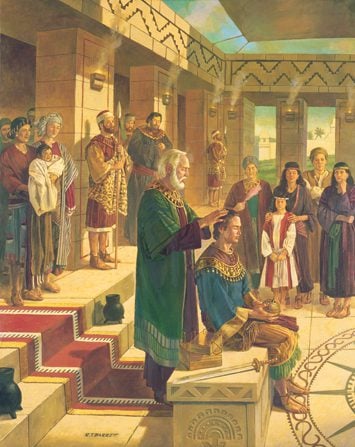
(Robert T. Barrett, LDS.org)
Here are some notes based upon John W. Welch, et al., eds. Knowing Why: 137 Evidences That the Book of Mormon Is True (American Fork: Covenant Communications, 2017):
And it came to pass that after king Benjamin had made an end of teaching his sons, that he waxed old, and he saw that he must very soon go the way of all the earth; therefore, he thought it expedient that he should confer the kingdom upon one of his sons.
Therefore, he had Mosiah brought before him; and these are the words which he spake unto him, saying: My son, I would that ye should make a proclamation throughout all this land among all this people, or the people of Zarahemla, and the people of Mosiah who dwell in the land, that thereby they may be gathered together; for on the morrow I shall proclaim unto this my people out of mine own mouth that thou art a king and a ruler over this people, whom the Lord our God hath given us. (Mosiah 1:9-10)
Once the people are gathered together, King Benjamin delivers a remarkable sermon (Mosiah 2-6), one of the greatest in scripture.
Beyond its wonderful doctrine, the speech also treats (1) the significance of kingship, (2) the new king’s coronation ceremony, (3) a series of events reflecting ancient Israelite and Near Eastern “treaty/covenant” patterns, and (4) an interrelated clusters of Israelite religious concepts involving “rising from the dust,” enthronement, kingship, and resurrection.
For this discussion, Knowing Why draws heavily upon the work of my former missionary companion and long-time friend and department colleague Dr. Stephen D. Ricks:
Paraphrasing Hugh Nibley, Ricks observed, “One of the best means of establishing a text’s authenticity lies in examining the degree to which it accurately reflects in its smaller details the milieu from which it claims to derive.”
Far from a warmed-over appropriation of nineteenth-century frontier revivalism, Benjamin’s speech deftly incorporates elements that accurately reflect many elements of ancient Israelite kingship and covenant ideology. As Ricks concluded, “That the covenant ceremonies in both the Old Testament and the book of Mosiah reflect an ancient Near Eastern pattern prescribed for such occasions may provide another control for establishing the genuineness of the Book of Mormon.” (185)
The principal sources here are:
Stephen D. Ricks, “King, Coronation, and Covenant in Mosiah 1-6,” in John L. Sorenson and Melvin J. Thorne, eds., Rediscovering the Book of Mormon: Insights You May Have Missed Before (Provo, UT: FARMS, 1991), 209-219.
Stephen D. Ricks, “Kingship, Coronation, and Covenant in Mosiah 1-6,” in John W. Welch and Stephen D. Ricks, eds., King Benjamin’s Speech: “That Ye May Learn Wisdom” (Provo, UT: FARMS, 1998), 233-276












